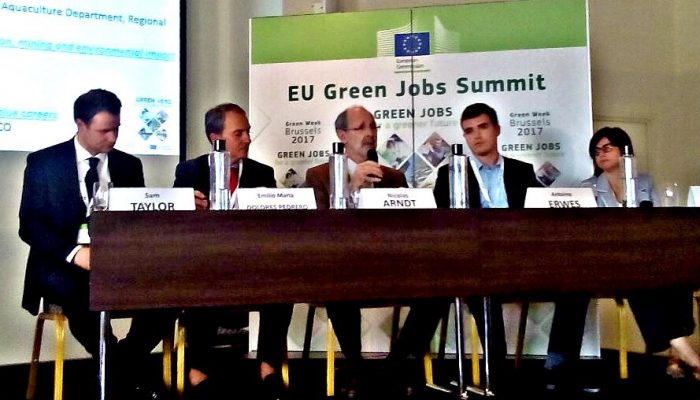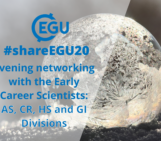
Last week I was in Brussels for the EU Green Week, an annual event that discusses European environmental policy. The event was jam-packed with policy-makers, entrepreneurs, innovators and a handful of researchers. Green Week allowed me to network and gain a better understanding of upcoming political issues while enabling the EGU to show-off some specialist knowledge with Nick Arndt, the Chair of the EGU Outreach Committee, participating in a panel discussion.
Green Week’s high level of participant diversity and focus on success stories and political cooperation is commonplace in policy driven events. However, it is a stark comparison to the academic focus and technical presentations that embody scientific conferences. These differences also permeated into the social aspects of the event with each participant seemly at the event for a specific promotional, networking or policy related purpose. The limited number of researchers present at Green Week was also quite noticeable but unfortunately rather typical of a policy focused event. And I say unfortunate because while these events tend to have a very different focus from academic conferences or meetings, the presence of scientists is vital.
Although it may seem a little contrived, the networking aspect of these politically orientated events is absolutely essential for collaboration, intersectoral coordination and, of course, science-policy communication. Attending events such as Green Week allows scientists to communicate their research to a non-academic audience while also: introducing scientists to formerly unknown organisations, demonstrating alternative methods of communication and highlighting issues that need greater research.
So, by now I’m assuming that I’ve convinced of the importance of scientific presence at policy driven events. Great! But how can researchers make the most of their resources and energy during the relatively short period of time that they have to network during the event?
- Be prepared: Investigate which organisations, companies and policy-makers will be attending and presenting. This can help you work out which presentations you should attend, potential connections you can establish and which components of your research are most relevant for you to showcase. Researching the websites or LinkedIn profiles of key participants may also give you additional talking points.
- Know your message: Conversations flow fast at policy driven events. This was particularly evident at Green Week with participants trying to network with as many people as possible during the short coffee breaks. It is important that you can present your research or convey a particular message within 60 seconds. Remember that policy-makers are interested in research that is relevant for their sector, identifies practical solutions and that can be used to identify policy options.1 For more tips on presenting information to policy-makers see the policy section of the EGU website.
- Find a conference buddy: Making a strong connection with someone who works in a similar field but different sector can be a diving block into a pool of new contacts. Determine the types of people your new buddy is interested in and try to introduce them to relevant people within your own network. Not only will this help your conference buddy and strengthen your connection, there’s a good chance that they will return the favour. While this is generally more beneficial during the event, introductions can be made afterwards via email.
- Aim for a two-way conversation: Although it can be tempting to talk non-stop about your own research (you are probably there to share it after all!), listening to other participants can be a valuable skill. Being an active listener helps you to understand the needs of the policy-makers, innovators and organisations that you are speaking with, subsequently allowing you to link the most relevant aspects of your research to their work. This may increase their interest in your research, provide you with insights into where further research might be needed and establish a foundation for continued cooperation.
- Remember that it’s a long-term relationship, not a one-night stand: The fast pace of policy events means that following up afterwards is essential. Building a non-academic database of these contacts can be a good method of keeping track of the people, where you met them and what components of your research they showed interest in.2 Methods of following up after the event can range from simply adding your new connection on social media to sending them a short summary of the research you discussed with them during the event.
You can also ease yourself into fully fledged policy events by attending science-policy events that are relevant to your research. Many of these events are advertised and regularly updated on the EGU Science Policy Events page.
References:
[1] http://onlinelibrary.wiley.com/doi/10.1111/j.1442-8903.2008.00416.x/full





Chippy
Good stuff Chloe !!